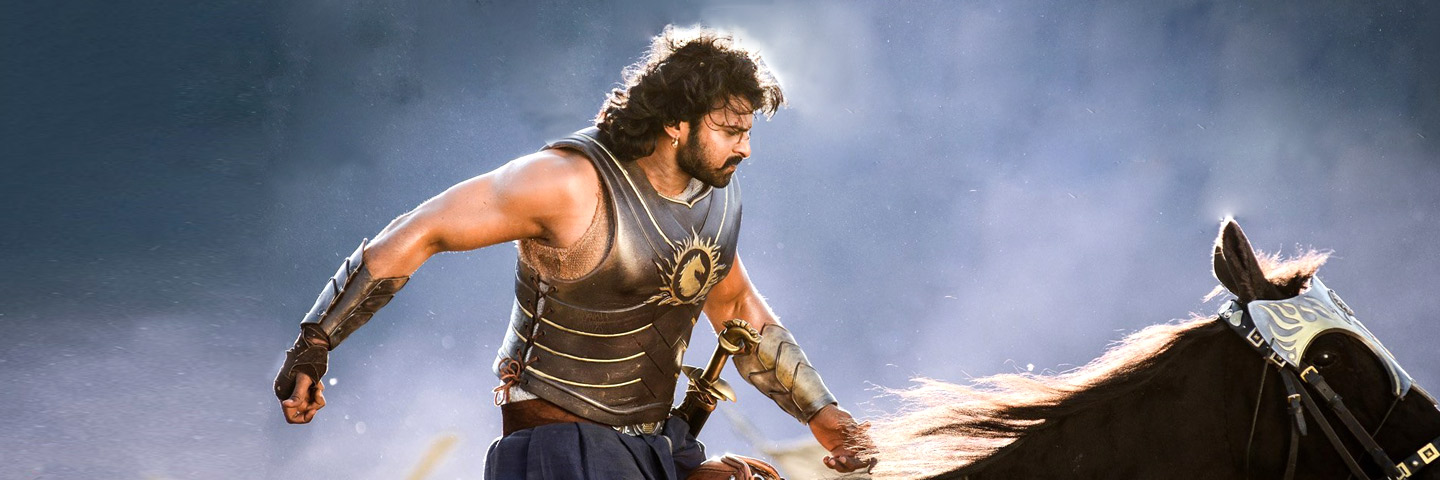In a land far away from the tyranny of oppressors in Mahishmati, a young boy once again prepares to scale the cascading waterfalls that tower over his home. These falls possibly lead to a land unknown to his folk, thus his mother’s concern over her adopted child’s obsession to explore. Years later, the grown man obsessively pursues his imagination of a fair maiden through the far reaches of the mountain’s daunting elevations, only to end up in a kingdom that needed saving. Little did he know of his past and the implications of his return to Mahishmati, that has been under the rule of a terrorizing King, who in turn had wrongfully made it to the throne but the young man who grew up as Shivudu, must embrace his original identity and claim succession to the throne as Baahubali. The much acclaimed telugu film director S.S. Rajamouli brings us the first of two chapters of an epic that draws inspiration from the likes of Mahabharat. There is no doubt whatsoever that this is the benchmark for films of epic nature in Indian cinema. Once you get past the romance and character intros, you will be in awe of the sheer magnitude of Rajamouli’s imaginative storytelling that takes you back to the glorious years of Mahishmati when a young prince rose to greatness.
Shivudu (Prabhas) grows up with his adoptive family at the foot of the daunting mountains and his curiosity for the world above leads him up top after repeated attempts since his childhood. The beauty and lure of its people, specifically Avanthika (Tamannah) keeps him intrigued and he soon discovers that she is a part of a rebel company that plans on rescuing former Queen Devasena (Anuskha Shetty) from the clutches of the evil King Bhallaladeva (Rana Daggubatti). The mysteriously faithful Katappa (Satyaraj) honors the king with the erection of a grand statue that is a cause for celebration for the pompous king. However, Shivudu’s timely appearance creates a furor among the slaves of Mahishmati and apprehension among the royalty. Soon enough, he attempts a daring rescue of Devasena, only to be pursued by Katappa’s men and in a streak of violence, beheads the young prince of Bhallaladeva. Witnessing a familiar indomitable warrior spirit before him, Katappa realizes that Shivudu is none other than the son of Amarendra Baahubali.
The film turns into epic mode in the flashback that relates to the dynamics between cousins Amarendra and Bhallaladeva. While they had mutual respect and admiration for each other, Bhallaladeva’s father always sowed the seeds of jealousy and insecurity in him. The result was competitiveness in the battlefield against a common enemy that was at their gates, threatening the very existence of Mahishmati. The Kalakeya army is a menacing creation by the film-makers and with their own language, they are almost as intimidating as the Uruk-hai. This epic battle is what makes Baahubali the 540 crore smashing masterpiece that it is. There may be inspirations from other big battle sequences from Hollywood but most of the sequences are unique in conception and flawless in execution. Make no mistake, this is Indian cinema at its remarkable best. Sivagami (Ramya) has promised the throne to the one who kills the enemy’s leader and the people’s favorite Baahubali will have to prove that he is more than just a warrior.
Prabhas’ efforts in adapting to the characters of Shivudu and Baahubali have resulted in him not only looking like the mighty warrior but his understanding of their back-stories makes him a credible protagonist. The range of emotions, his demeanor as the young Prince and his learned skills in the battle work brilliantly together for a solid, heroic performance. Rana Daggubatti makes a malicious villain and in a movie of this scale, the antagonist must seem more powerful than the hero. Rana’s brawn and cunning lend credibility to the negative character that will hopefully play an even bigger role in the conclusion. Anuskha Shetty and Ramya are excellent in their roles of the strong women in an otherwise male-dominated film. Tamannah looks gorgeous as the rebel Avanthika and has executed some fighting skills competently.
Kattappa is possibly everyone’s favorite character owing to his loyalty and mysterious allegiance to Bhallaladeva. The climax puts him in the spotlight of discussions after the movie and his grey character is just an exemplary portrayal by the much accomplished, Satyaraj.
Vijayendra Prasad’s story and Rajamouli’s screenplay make an intriguing epic. Although it has drawn some inspiration from the Mahabharata in terms of the family rivalry, it holds its own depth and engagement for the viewer. The final twist is exciting enough to justify mass hysteria for the second installment. Barring some of the banal love saga, the film offers few loose ends. Although the numerous songs certainly slacken the pace of an otherwise tight screenplay.
The production and art design are very detailed and the use of visual effects to depict the city only make things more credible for the period film. The intricate costumes and weapons match the epic look of each scene and this level of commitment by the film-makers reminds us of none other than Peter Jackson.
In a feat never before achieved by native cinema, Rajamouli will pull off another huge success when the conclusion of this tale releases in theaters next year. Fans will be eagerly awaiting more revelation of the plot line as well as big battles. Baahubali: The Beginning makes a huge impression for viewers of hindi cinema who would normally typecast their counterparts from the south. Unanimously, people have concluded that this is a grand representation of the best of Indian cinema, rather than of a particular language or territory. You owe it a viewing just for that.
9.213 on a scale of 1-10.


